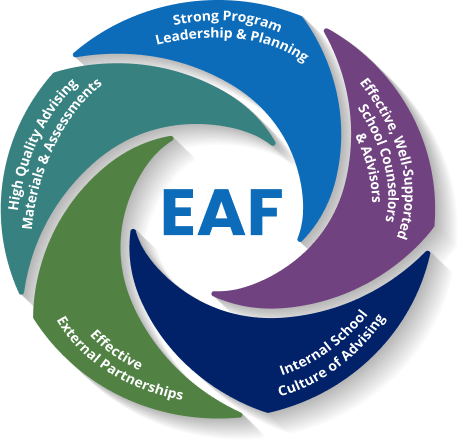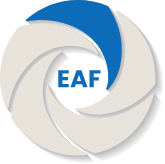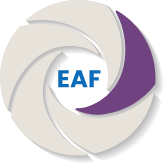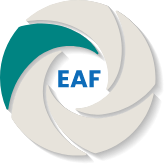Build a Strong Foundation for Effective Advising
District Commitments
Essential Actions
Key Practices

Understanding the Effective Advising Framework
The Effective Advising Framework defines five key levers that, together, form the foundation of effective advising programs. For each lever, the framework outlines commitments that must be made at the district and campus levels to enable programmatic success, and essential actions that must be taken to propel that success. The five key levers include Strong Program Leadership and Planning; Effective, Well-Supported School Counselors and Advisors; Internal School Culture of Advising; Effective External Partnerships; and High-Quality Advising Materials and Assessments.
Explore the Levers

Lever 1
Strong Program Leadership and Planning
A steering committee with clear roles and responsibilities will develop, implement, and monitor an individual planning system that supports all students in their postsecondary planning and preparation.
Essential Action 1.1
Develop clear data-driven goals for the individual planning system to graduate all students to be ready for college and career, including careers in the military.
Essential Action 1.2
Set K-12 grade level expectations for academic development, career development, personal and social development, and financial literacy to ensure all students are on-track to graduate prepared for postsecondary success.
Essential Action 1.3
Develop an organizational structure for the school counseling program staff and internal partners who will be responsible for the implementation of advising services that lead all students toward grade level expectations.
Essential Action 1.4
Identify tools and resources to support the leadership and planning of the individual planning system.
Essential Action 1.5
Identify external partners to fill gaps in the implementation of effective advising.

Lever 2
Effective, well-supported school counselors and advisors
A strong comprehensive school counseling program retains effective, well-supported school counselors and advisors by strategically recruiting, selecting, assigning, and inducting school counselors and advisors, so that all students have equitable access to high-quality advising.
Essential Action 2.1
Recruit, select, assign, induct, and retain highly-qualified school counseling program staff to lead the implementation of the individual planning system.
Essential Action 2.2
Build school counseling program staff capacity and efficacy through frequent check-ins and evaluation cycles.
Essential Action 2.3
Build school counseling program staff knowledge and expertise through ongoing professional development that focuses on ensuring equal access as well as deepening advising skills to support student’s academic, career, and personal and social development and financial literacy.

Lever 3
Internal School Culture of Advising
A school culture of advising requires a universal commitment across the district to prepare all students for postsecondary success, which includes providing students with the necessary support to navigate their individual career and education pathways.
Essential Action 3.1
Integrate the district’s vision, mission, and goals into the individual planning system.
Essential Action 3.2
Require training on the fundamentals of advising for all district staff who work directly with students and include additional required advising-related training for staff with specific advising support roles.
Essential Action 3.3
Communicate programmatic updates and student metric tracking to staff and community partners throughout the year to facilitate shared understanding, responsibility, and urgency.
Essential Action 3.4
Engage all students in the individual planning system as key stakeholders throughout program development, delivery, and evaluation to support students in taking ownership over their postsecondary planning.
Essential Action 3.5
Involve families and the community as key stakeholders throughout program development, delivery, and evaluation.

Lever 4
Effective External Partnerships
Effective external partnerships are created by strategically selecting partners to fill gaps in district service delivery, provide specific content expertise, and support the individual planning system.
Essential Action 4.1
Strategically select external partnerships to fill gaps in service delivery and provide intended student services.
Essential Action 4.2
Consistently manage external partnerships.
Essential Action 4.3
Consistently evaluate external partners against program goals.
Essential Action 4.4
Communicate programmatic updates and student metric tracking to all external partners throughout the year to facilitate shared understanding, responsibility, and urgency.

Lever 5
High Quality Advising Materials and Assessments
All students and their caregivers frequently engage with high-quality advising materials and assessments that support them in identifying postsecondary options as well as planning and preparing for postsecondary success.
Essential Action 5.1
Define a quality standard for materials, tools, and resources that support college, career, and military awareness, exploration, and preparation.
Essential Action 5.2
Integrate materials into the individual planning system to support parent and family engagement.
Essential Action 5.3
Provide adequate time and training for fidelity of implementation.
